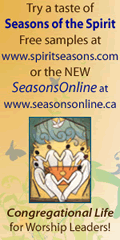Vol 8 Issue 1SectionsPriorities This IssuePrioritiesAfter Easter: Hope, and Happy Birthday!>> Extended Interview with Rev. Dr. Michael Kinnamon>> The Text, Webster, and Intuition>> TransitionsAnother Really Big Fish Story>> TraditionsEaster, Hope, and “Happy Birthday!”>> “Children, Have You Any Fish?”>> Wisdom & WonderingI am going out to fish>>
|
ArchiveMemories, Meaning, and Teaching Advent/Christmas: An Interview with Delia HalversonFounder of Faith Discovery Ministries, Delia Halverson is a Methodist Christian Educator and author of How Do Our Children Grow?, 32 Ways to Become a Great Sunday School Teacher, The Nuts and Bolts of Christian Education, Leading Adult Learners, Helping Children Care for God's People, New Ways to tell the Old, Old Story and other works. Her latest book is Teaching and Celebrating the Christian Seasons. Delia lives and works out of her new home in Woodstock, Georgia, USA, a suburb of Atlanta. Janine: Delia, what does Advent mean to you? Delia: I think that Advent means an excitement of a new way of life for the world. I think it means an excitement of anticipating what we can do with the messages of God's love. And, how we can share that message with others and of course, by sharing Christ with others we are sharing the message which Christ brought… of God's love. Janine: What does Christmas mean to you? Is that any different from your feeling about Advent? Delia: I guess that I look at Advent as being the preliminary to Christmas, and Christmas itself, I'm not sure has extremely more meaning than Advent does to me. Because I enjoy, my personality maybe, enjoys anticipation so much at this time. Janine: That's wonderful! Okay, what are your favorite memories of this season of the year? Delia: As a child? Janine: As a child, growing up, as an adult. Just think of some of the memories that stand out for you. Delia: As a child, I think my primary memory is of waking up in the morning on Christmas day and hearing a group singing Christmas carols outside my window. We lived in Florida. My dad was a minister and it was in Ybor City which was a Latin section of Florida, of Tampa; Hispanic we would say now. We called it a Latin section then because there were Cubans, Spanish, and Italian people. They usually would party on Christmas Eve and have big family events until midnight, two or three in the morning sometimes; in fact, all night, many of them. So at four or five o'clock in the morning, Dad would gather the young people and they would go caroling to the different homes, early, early, in the morning to "sing Christmas in." And they would always end up at our house, the last house, and they would have some sort of breakfast or something. But this would wake me up on Christmas morning. I think that this was my favorite part of Christmas even more so than the idea of opening gifts, was that hearing them sing early in the morning to wake you up. Janine: Has that made any difference in your feelings about Christmas? Delia: Well, it probably put an emphasis on the true meaning of Christmas more than receiving gifts. I think another part that has made a difference is the attitude that I suppose my parents instilled in me and I tried to do it with our children, and our grandchildren. That is, in looking to buy gifts, trying to think how the receiver would feel when they opened that gift or gifts. Janine: From your perspective as a Christian Educator, mother, and grandmother, do you have any suggestions or ways that we can best teach Advent/Christmas? Delia: I think that one of the best ways to teach Advent/Christmas is to encourage the enjoyment of expectation. We need to use stories of Jesus as an adult as well as a baby during this time. We need to help people to "remember" when Jesus (the man) was a baby. It's also important to help them know what life might have been like at that time. I like "might-have-been" stories for this. It is important to be sure that they realize that these are stories of what MIGHT have happened, while we also read the Gospel version. I particularly liked what Delia had to say about "encouraging the enjoyment of expectation" as well as imagining "what might have been" as well as sharing the simple Christmas stories in Matthew and Luke. That practice also helps us to enjoy and define what is imaginary, glean what is "learned" (from historical and other research), and delight in as well as treasure the Gospel accounts of the birth of Christ. Through that process, we are able to transfer that sense of expectation across thousands of years and become new people of faith. Advent becomes Christmas for all of us. © 2002 Janine C. Hagan | View
for Printing
|
| All Content Copyright © 2008 ecumininet online!, Spiritual Systems Inc. - Site Design & Maintenance By Atomic Pixels | ||

